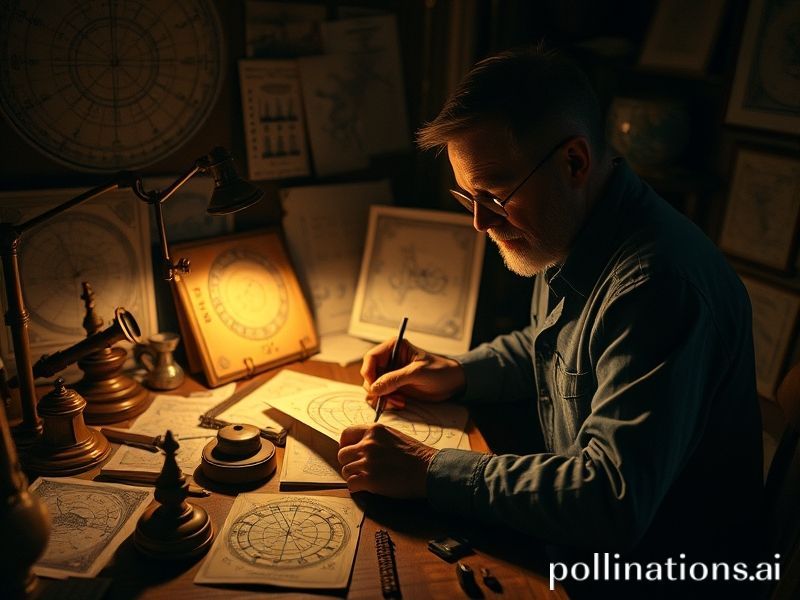Global Panic, Velvet Jackets, and Christopher Renstrom: How One Astrologer Became the World’s Favorite Doomsday Comfort Blanket
From the Rooftops of Rome to the Boardrooms of Beijing, Humanity Still Checks Its Horoscope
By Our Cynical Correspondent, currently avoiding Mercury retrograde in a windowless bar in Lisbon
Dateline: Somewhere over the Atlantic, Wi-Fi sputtering like a dying oracle
Christopher Renstrom—San Francisco astrologer, Renaissance-costume enthusiast, and unlikely geopolitical weather vane—has become the preferred cosmic gossip columnist for a planet that can’t decide whether it’s ending or merely rebooting. While the Arctic melts faster than an Aries temper, central bankers from Frankfurt to Jakarta still sneak a glance at Renstrom’s daily forecasts, hoping the stars will tell them whether to buy bitcoin or canned beans. It’s a touching tableau: the same species that split the atom now waiting for a man in a velvet jacket to explain why the Wi-Fi is down (spoiler: Mercury did it).
Renstrom’s horoscopes, syndicated in six languages and reposted by everyone from Lagos crypto-bros to Seoul K-pop managers, function as a kind of celestial Reuters feed for the spiritually hungover. When he warned that the January 2023 Mars-Uranus square could “cause markets to behave like toddlers on espresso,” the Shanghai Composite obliged by dropping three percent and spilling juice on the carpet. Coincidence? Perhaps. But in a world where algorithms now read the stars faster than any human astrologer, the joke is that Renstrom’s medieval metaphors still outperform most hedge-fund risk models—probably because Mercury doesn’t charge two-and-twenty.
The French, ever allergic to Anglo-Saxon mysticism, dismiss astrology as “la commodification de l’angoisse,” yet Le Monde still publishes Renstrom’s column sandwiched between stock indices and obituaries—a placement so ironic Sartre could have curated it. Meanwhile, in Buenos Aires, where inflation runs hotter than a Scorpio at last call, citizens consult Renstrom’s weekly “Pluto in Aquarius” updates the way previous generations studied grain prices. When Pluto promised “tectonic shifts in collective trust,” nobody expected the central bank to literally misplace four tons of gold, but here we are. Astrology: 1, Monetary policy: 0.
Naturally, the Chinese internet has its own opinion. On Weibo, Renstrom is nicknamed “the American Nostradamus who can’t shut up about Saturn,” and his horoscopes are machine-translated into Mandarin with all the nuance you’d expect. The algorithm renders “You may feel like the universe is testing your boundaries” as “Universe now administers standardized examination; prepare Number 2 pencil.” Still, tech workers in Shenzhen screenshot the posts before their VPNs expire. In a surveillance state, even cosmic advice feels subversive—especially when it tells Aquarius to “delete the apps that harvest your soul, or at least turn off notifications.”
Across the Indian subcontinent, Renstrom competes with a 3,000-year-old Vedic tradition that already knows your moon sign, your past-life tax returns, and the exact moment you’ll regret texting your ex. Yet urban millennials in Mumbai still forward his memes because, as one marketing executive told me between sips of overpriced turmeric latte, “Western astrology is like McDonald’s: not authentic, but consistent.” She then asked if Jupiter trine Venus was a good time to launch her NFT of crying emojis. I told her the stars favored anything with crying emojis; the universe has a sense of humor, just not necessarily a kind one.
The darker joke, of course, is that Renstrom’s gentle admonitions—breathe, surrender, trust the process—land on a planet actively perfecting new methods of self-immolation. While he advises Capricorns to review their 401(k)s, Pakistan floods and European heatwaves render compound interest somewhat academic. Yet the appetite for twelve tidy paragraphs of cosmic reassurance remains bottomless, proving that humans would rather rearrange starlight than furniture in a burning house.
Still, give Renstrom credit: in an attention economy addicted to outrage, he sells a quieter brand of doom. His horoscopes don’t promise apocalypse; they offer the far more radical suggestion that tomorrow might actually arrive, and you might still have to live with yourself when it does. That, dear reader, is the most terrifying forecast of all.
As this plane descends and the cabin crew announces “return to your seats, fate is non-refundable,” I close the app. Somewhere below, 7.9 billion people are choosing between despair and astrology. The stars, indifferent as ever, keep twinkling like distant slot machines. Place your bets.







